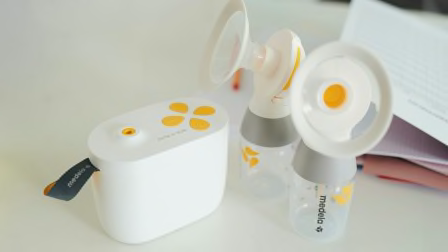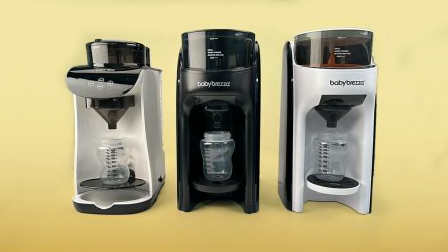If Your Breastfed Baby Won’t Take a Bottle, You’re Not Alone
Baby ‘bottle refusal’ is real, and we talked to moms who’ve experienced it and to experts to find ways to help prevent and mitigate it, though they warn that there are no guarantees
When you shop through retailer links on our site, we may earn affiliate commissions. 100% of the fees we collect are used to support our nonprofit mission. Learn more.

When Anna Maltby, a mom in Brooklyn, New York, prepared to go back to work after a four-month maternity leave with her second baby, she encountered a significant problem: Her baby wouldn’t take a bottle. “We had been together for my whole maternity leave. I don’t think we’d really tried bottles that much,” she says. “It was very stressful. I definitely was crying and losing my mind and losing sleep over it.”
It’s an issue I hadn’t faced, let alone heard of, until very recently.
Breast Pumping 101
What We Know About Bottle Refusal
There are solutions to what’s known as bottle refusal, though many moms—at least, those who are lucky enough to have parental leave and can breastfeed their children without interruption or issue until they return to work—never hear that it’s something they need to prepare for.
Many parents can avoid bottle refusal with a little forethought and guidance, but as it stands, unless you know other parents who have dealt with bottle refusal, you might never have even heard of it, and thus have no idea it’s something that even needs to be addressed.
To date, there are only a handful of studies dedicated exclusively to the topic of bottle refusal. “It’s definitely an area that has not been researched enough,” says Britt Pados, PhD, a neonatal nurse practitioner and lactation consultant who has conducted research on infant bottle feeding.
Though studies have looked at neonatal infants (in other words, babies in the NICU) with feeding difficulties, there’s little done on babies who won’t or can’t take a bottle in the home setting. “There’s a general understanding that some babies have difficulty with breastfeeding, and I just think most people don’t recognize that it can be a problem for a baby to feed from a bottle.”
How Bottle Refusal Affects Moms
Breastfeeding issues can be emotionally devastating, especially in a culture that stresses the importance of breastfeeding. But when only about 27 percent of American workers have access to paid family leave, the return to work can become even more stressful if you have no idea how your child will eat in your absence.
“The mental load of being the only person responsible for feeding took a huge toll on me, especially as I was preparing to return to work,” says Kerry Rose, a mom based in Philadelphia. “One of my best friends from home didn’t realize bottle refusal was a thing until she went back to work with her second (COVID) baby at 9 months. Kid never took a bottle—she just wound up [drinking from] cups.”
I hadn’t heard much, if anything, about bottle refusal from any of the many lactation consultants and postpartum nurses I saw who helped me with breastfeeding. These experts paid me a lot of care and attention when I needed it; I was incredibly lucky to have a thoughtful, kind care team who helped me recover physically and emotionally from a difficult labor and eventual cesarean section.
But bottle refusal was left off the agenda. Perhaps they thought that because my son had been in the NICU and drank from a bottle there, there was no reason to worry about bottle refusal in the future. But I didn’t keep up the bottle feeding; I was home recovering, and from my perspective, there was little need to hook myself up to a pump or give him formula.
So instead, at four months, I poured some formula into a bottle and placed it against my son’s lips. He looked at me, baffled, and turned his head away. I gave the bottle to my husband, who was similarly unsuccessful.
Rarely would my baby cry, unless I tried to sneak the bottle nipple into his mouth while breastfeeding; clearly, he found this an unpleasant surprise. He’d grin at me, his gums resting on the bottle nipple, as if it weren’t a mechanism for feeding but rather a toy to teethe.
I talked to friends. I talked to a pediatric occupational therapist whom we were seeing for another issue—she gave me tips for exercises I could do to get my son’s apparent high mouth palate accustomed to pressure, such as from a bottle nipple or pacifier (which he similarly wouldn’t—and still won’t—take).
I visited the lactation consultant center that had done so much to help me breastfeed, though the consultant I saw that day hedged her advice on the caveat she wasn’t a bottle-feeding expert. I left the house while my husband tried to bottle feed. I bought what feels like a million different bottle types (but in reality, I think it was only four) and was gifted endless more from other moms who’d gone through a similar debacle.
And then the day came: my baby’s first day at daycare. He still refused to take a bottle.
Ashley Lester, a mom in Houston who faced bottle-feeding issues with both children while a medical student, says daycare providers had to compel her daughter to take a bottle because she refused to do otherwise. “I felt powerless and trapped. There was nothing I could do, short of dropping out of school,” she says. “I brought it up at every single one of [my daughter’s] well visits along with her low BMI (like below 10th percentile), and it was just like ‘well, she’s breastfed, so…’ Like breast was best, but it’s also your fault they won’t eat.”
Expert Tips for Preventing and Resolving Bottle Refusal
Clare Maxwell, PhD, a program lead of advanced clinical practice midwifery at Liverpool John Moores University in the United Kingdom and one of the few researchers who has studied bottle refusal, says women have talked to her about how they felt they should stop complaining about bottle refusal because their baby can breastfeed well.
Bottle refusal “needs to be recognized as an issue for parents and one that can create a negative impact for them, rather than it being dismissed,” she says. “There needs to be more emphasis on bottle refusal (in virtually all cases) being a ‘normal’ reaction by a baby rather than being something abnormal and that it is not due to mothers doing anything wrong.”
Normal or not, fearing that your child won’t get enough to eat, and thus won’t be healthy and won’t grow at a good pace, is torturous. If I had known that bottle refusal was a possibility, I could have attempted strategies to mitigate the issue before it became a crisis.
“Introduce very tiny amounts every day or every other day just to keep the baby in the game,” says Jill Rabin, a pediatric speech language pathologist and lactation consultant. This can help decrease the likelihood that bottle refusal will be a problem.
Even still, there’s no guarantee that your baby won’t one day simply decide they don’t like the bottle anymore (this happened to two moms I talked to for this piece). It might be that you have a particularly opinionated baby. “We underestimate the individual personalities and temperaments of newborn babies and that this may be a key driver in refusal,” says Maxwell. “An example of this would be mothers telling me one of their babies was a ‘refuser’ and another wasn’t—and that they did nothing different.”
A Bottle-Feeding Miracle for My Family
On his first day of daycare, my baby took one 4-ounce bottle. The following day, two bottles, each 4.5 ounces. The next day—three bottles. But he wouldn’t take one from my husband or me until more than a month later, once we fitted a Lansinoh bottle with a size 2 nipple and filled it with warm—not room temperature—formula.
I credit my child’s daycare teachers for remedying an issue that could have been disastrous, by patiently offering him bottles until he decided he’d regularly take them. If I ever have another baby, I’ll attempt to stave off the problem entirely by keeping a bottle in the rotation. But I’ll prepare myself emotionally, too, for the possibility that any child of mine simply knows what they like and what they don’t, and that they’ll hold fast to any opinion—at least until they get too hungry.




















